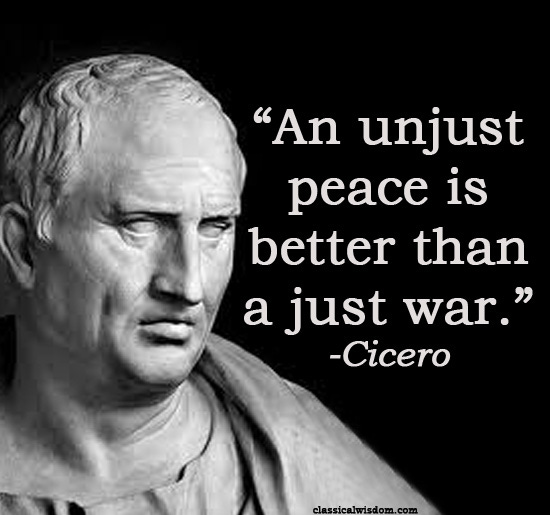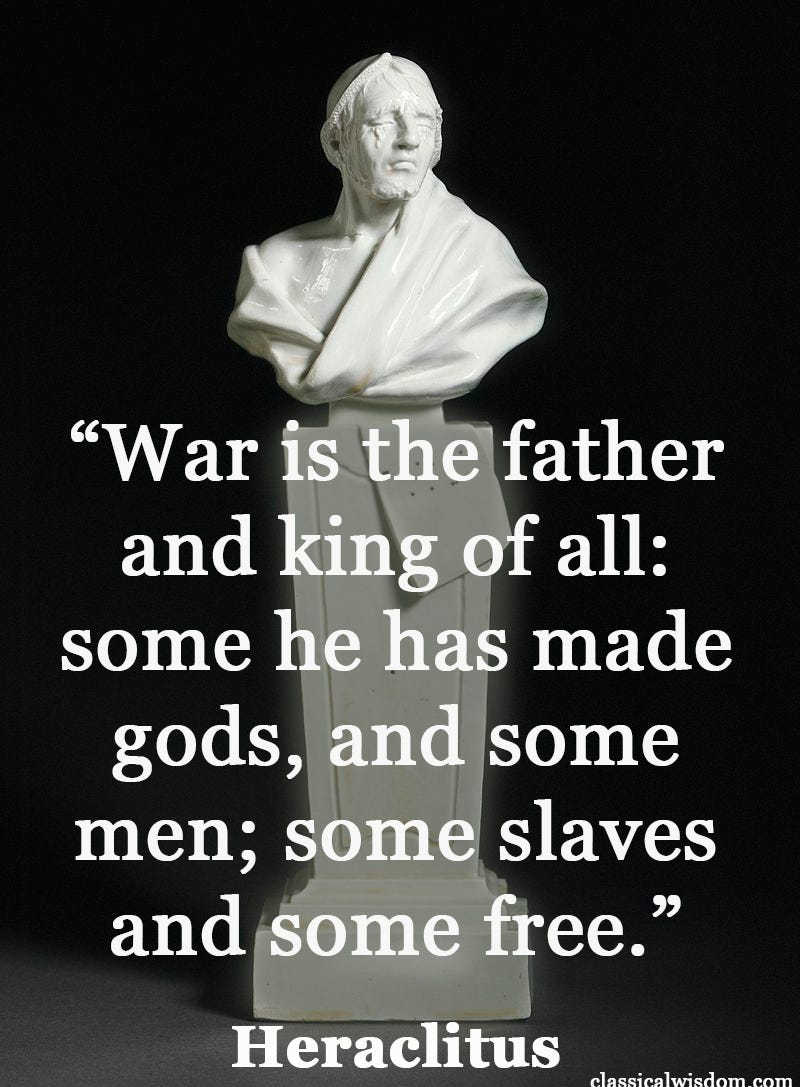Dear Classical Wisdom Readers,
Some quotes get the conversation started more than others... and Cicero’s line above certainly stirs up the discourse. So much so, that it was only a matter of time really before we were destined to dedicate a full mailbag edition to the question at hand.
But let’s back up a bit first, shall we? And take a closer look at war.
Obviously it’s as old as man himself, with no corner of the globe being excused from this most dangerous of past times. According to professor Lawrence H. Keeley, author of War Before Civilization, approximately 90–95% of known societies throughout history engaged in at least occasional warfare, and many fought constantly. Indeed, while we bemoan (rightly) the current state of affairs that have resulted in bloody conflict, it’s worth noting that modern western societies are significantly less violent than various historical groups.
We see this consistently in the ancient world. Not only are the dramatic battles and sieges a regular occurrence in the annals of history, they are also glorified, immortalized and held up as shining beacons of triumph and conquest.
While today we are more prone to pay attention to the death and destruction that comes with combat... there could be something said about the ingenuity and progress that often accompanies these violent engagements. A brief review of history’s peaks of innovation, such as the golden age of Athens, the Renaissance or the Enlightenment, and surprisingly you’ll find war lurking around the corner rather than peace. Whether it be the Peloponnesian, the Persian, The Thirty Years, or the War of Religion, it appears that these stark competitive environments may have been fertile grounds for innovation.
In The Third Man, Orson Welles’ character Harry Lime says,
“In Italy for thirty years under the Borgias, they had warfare, terror, murder, and bloodshed, but they produced Michelangelo, Leonardo da Vinci, and the Renaissance. In Switzerland, they had brotherly love, they had five hundred years of democracy and peace, and what did that produce? The cuckoo clock.”
Bringing it back (way back) to the ancients, in the words of the Greek pre-Socratic philosopher, Heraclitus:
“War is the father of all and the king of all; it proves some people gods, and some people men; it makes some people slaves and some people free.”
So now that we have established just how unfirm the grounds of war and peace are... let’s us to return to Cicero’s opinion on the two and see if we agree:
Is an unjust peace better than a just war? Does war have its virtues or is peace supreme?
And can we who are not destined for bloody battlefields opine on the matter in the first place?
As always, you can write to me directly at anya@classicalwisdom.com, comment below or reply to this email.
Now from War to Love... please enjoy today’s replies discussing “What is Love?” below.
Enjoy!
All the best,
Anya Leonard
Founder and Director
Classical Wisdom
P.S. Perhaps no family encompasses the extremes of love and war than the Julio-Claudian Dynasty. Rome’s first five emperors (along with their wives, sisters, sons, daughters and more) is like a real life telenovela… only WAY more intense. Members: Watch your inbox for our Ebook covering this incredible (and incredibly interesting) time period coming out Wednesday.
Monday Mailbag
Anya,
Aristotle—unsurprisingly—points us along the right path. The maxim, “you must love yourself before you can love others,” means to first want the best for your Self and to seek your well-being and happiness.
I love ice-cream and ideas, football and friends, opera and oceans, role models and heroes, . . . , and my wife. I leave to context, adjectives, and descriptions the role of explaining the detailed kind of love. I lovingly leave love to denote my response to everything that contributes to my well-being and happiness—the essence of the meaning of love.
Loving your work on Classical Wisdom,
Robert H.
-
I must comment on this article a bit and am glad The Art of Love was brought up, but Ovid wrote this, as said, with Augustus in mind regarding morality, but basically, it is about the culture of adultery. The medieval Troubadours picked up on this and created a poetry of Courtly Love, which was the antithesis/parody of the then Catholicism. It is about Eros as opposed to Agape, or Cupiditas as opposed to Caritas. Basically, romantic love cannot be sustained in the business of marriage as it is an institution which is the base of civilization. In other words, civilized society falls apart with romantic love as the lovers are not of this world once Cupid's arrow hits, which is similar to Saints in the name of God; they are not of this world anymore. There is much written about this, so I refrain from interpreting, but if one looks at the many love stories of the world, they are adulterous in nature and the relationship must have taboos: Tristan as well as most Arthurian Romances or any of the Telenovelas (soap operas) on TV. Yes, "Romeo and Juliet" does not have direct adultery but does have taboos which are adulterous in nature. One very good book on the subject is Love in the Western World by Denis de Rougemon.
Herman H. San Francisco
-
I have always found love to be synonymous with gravity, amorphous, just plain hard to describe, but when smitten, I would say you have a better chance of jumping off of earth.
Stephen R.
A couple of thoughts about “love”:
Firstly, I have never thought it wise to refer to Lust as Love. Love has been given the barn door. It’s definition is too wide IMO.
Secondly, I believe the statement “You must love yourself before you can love others” is a half truth at best. It must be qualified. You could just as easily say “You must have the capacity to love others before you can truly love yourself”. Pure, unalloyed self-love is a symptom of evil. It is narcissism.
Why are there so many definitions of love that do not, on close examination, share the same characteristics, however we insist on using the same word?
Brien
-
Perhaps at its simplest it is the absence of fear and an affirmation of the mystery of life…..
T.L.P.
-
Love is willing the good of the other because they are made in the image and likeness of God as are we all, according to Thomas Aquinas.
Chris C.
-
One of the greatest sources of what is Love, that I have read, comes from Plato's Dialogue of the Symposium. There are the common answers people give, and those of Aristophanes. But most importantly the answer Socrates gave, shedding a whole new light on the subject.
Warren B.
Love is defined as the unending feeling of acceptance of another. A marriage that endures has the quality of two separate people becoming one complete person. Holding your newborn for the first time is another expressed manifestation of love.
First Corinthians 13:4 says Love is patient and kind; love does not envy or boast; it is not arrogant or rude. It does not insist on its own way; it is not irritable or resentful; it does not rejoice at wrongdoing, but rejoices with the truth. Love bears all things, believes all things, hopes all things, endures all things.
Love requires truth and truth is God’s Word. Love is an expression of that Word. The author of Creation is also the inventor and provider of love. He sent His only begotten Son to die for us and create an inheritance for us to overcome our sin as children of Adam and Eve. No greater love shall ever exist and as only God could create love and only the same God could love us so much to become incarnate and die that we might be saved and spared the consequences of our sins. That is the greatest love of all.
Charles F.
-
Anya, I had a friend who was a surgeon. He gave up his surgical practice in his fifties as he wanted to be a poet or songwriter. He is now deceased but his poetry lives on. His short book of his poems is called Where The Wind Takes Me. For the moment the wind has taken you to the land at the end of the world.
A songwriter named Mike Jones wrote a song called What Is Love. The band Foreigner made it a number-one hit in the eighties. The lyrics ask the question but don’t provide the answer. “I want to know what love is. I want you to show me. I want to feel what love is. I want you to show me.”
The doctor-turned-poet has the answer. My wife and I were visiting him, and he asked us if we knew what love was. We tried all the usual suspects, but with each wrong guess, his smile got wider. He would not give his secret away without first torturing our feeble minds. Finally, he decided enough was enough, and he gave us his poem with a look of victory on his smiling face.
What IS LOVE by Fairfax Conquest
“What is love, Daddy?”
My young daughter asked of me.
What is love?
I put my arms out to her,
And beckoned with a smile,
And searched my very soul
For answer to the child.
I pressed her head against my heart,
As tears fast filled my eyes.
And there we stood
As two made one!
Love’s soul that never dies.
Suddenly she stepped away
Her face like the sun above.
Now I know her voice exclaimed!
To me, a smile is love!
Ah, she had not seen my tears,
Nor heard my pounding heart’s alarms.
In time, she’d know how love fulfilled
First brought her in my arms!
I smiled back at her…
Oh! I smiled back at her…
Randolph H.








I don’t think I can opine on specifics of war or peace, as both could be considered just or unjust in the eye of the soldier and combatant, as they walk across the field. What are their thoughts? What are their experiences? Does peace follow war?
What did Germans think or feel immediately following WWI? What did they feel following WWII? What are their perceptions with a heightened likelihood of WWIII?
Who defines war or peace? I feel that virtue does not seamlessly fit into each definition, and hold it moreso in attempt to understand the minds of the persons in control of the events. Is a wise decision being made? What is my oweness to society? What balance or outcome will result? Am I led by courage or ego?
My grandfather, a WWII veteran, with tears in his eyes said one thing to me as he shared his experiences…”Don’t let war happen” I believe he had the same perspective as Cicero, unjust peace is better than a just war.
Its a really excellent topic thank you.
Its one I think where the answer may depend on particular circumstances.
I just wrote a piece grappling with these issues as they apply to Ukraine and Russia. I feel firmly, at least in this case, that an unjust peace would not be peace at all where Ukraine is forced to cede more of its provinces. An unjust peace often only legitimatizes the violence/domination that would otherwise be contested in war. Every time a city is liberated in Ukraine we hear about mass torture. Ukraine suffered millions of unnecessary deaths under the Kremlin with Stalin’s 5-year plan and associated man-made famine.
Ukraine should reasonably expect to suffer similar atrocity regularly in the future if they remain under the whims of a foreign dictatorship. So, that sort of peace seems worse than war from where I’m sitting.
https://radmod.substack.com/p/flashback-to-2016-the-5-year-mariupol